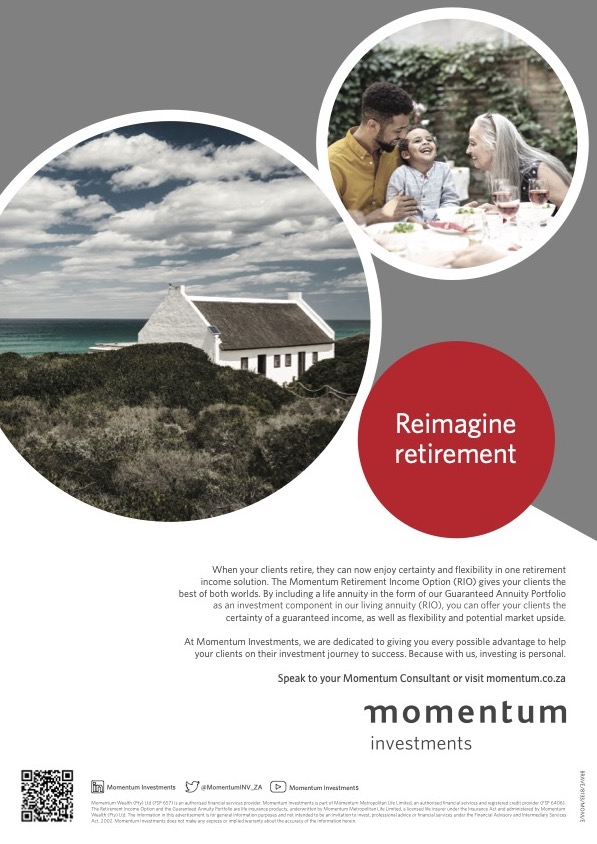By Erica Roux, Masthead Practice Management and Projects Specialist
Regardless of the circumstances – be it retirement, unforeseen events like illness or death or personal responsibilities – everyone will eventually exit the financial services industry.

As the owner of a financial advisory business, it’s imperative for you to identify a successor who can seamlessly take over the reins one day. This will safeguard your interests, as well as those of your clients and staff.
Succession planning involves a comprehensive strategy that aims to transfer business ownership to a successor, either someone within your company or an outside individual or business. This strategic approach ensures the business can continue its operations even when the owner steps down.
Beyond continuity, succession planning also ensures the value owners have accumulated in their businesses after years of diligent work is realised when they exit, either as valuable retirement capital for themselves or inheritance for their beneficiaries.
How planning ahead benefits your business
Planning helps to maintain client relationships. A well-thought-out succession plan instils confidence in customers, suppliers, investors and other stakeholders by demonstrating that the business is prepared for the future and has a plan in place for ensuring stability and growth.
Secondly, planning mitigates risks. Life is unpredictable. If an owner needs to step down earlier than expected due to health problems or an accident, a well-thought-out succession plan can ensure a smooth transition, minimising risks and ensuring compliance. Moreover, the owner won’t be forced into a quick sell to cover medical or other costs.
Planning adds value to a business. A succession plan will enhance a business’s value, making it more attractive to potential buyers or investors.
Planning also adds an element of sustainability to businesses. Through succession planning, a business can identify and develop talent within itself, ensuring the business can continue to operate effectively even after key employees retire.
Finally, planning involves the transfer of knowledge. Documenting critical information and knowledge held by key employees is an integral part of succession planning, and this retains and transfers the business’s intellectual capital to the next generation of advisors, ensuring that clients continue to receive high-quality advice and service.
Navigating the complexities of succession planning
There is no denying that succession planning is a complex, intricate endeavour. By taking the necessary steps, however, you can implement a plan that will benefit all role players.
By taking the following steps, you can ensure your succession plan is practically implementable:
- Consider the legal structure of your business and whether it exists as a separate legal entity. For example, a sole proprietorship – a business that is owned and operated by a natural person – will cease to exist when the owner steps down or dies. In other words, a successor won’t be able to take over the FSP’s licence or business. On the other hand, if your business is, for example, registered as a private company, also known as a (Pty) Ltd, it is a separate legal entity. It can continue in your absence, and its licence can continue under the oversight of an alternative Key Individual.
- Identify a successor – either from within your business or bring one into your business.
- Include your succession plan in your will.
- Specify in your succession plan how the purchase should be paid, for example as a lump sum or in instalments.
- Clearly specify in your succession plan the amount your successor should pay you or your beneficiaries when you exit, as well as any other terms, such as arrangements in terms of existing staff, etc.

Reimagine retirement
When your clients retire, they can now enjoy certainty and flexibility in one retirement income solution. The Momentum Retirement Income Option (RIO) gives your clients the best of both worlds. By including a life annuity in the form of our Guaranteed Annuity Portfolio as an investment component in our living annuity (RIO), you can offer your clients the certainty of a guaranteed income, as well as flexibility and potential market upside.
At Momentum Investments, we are dedicated to giving you every possible advantage to help your clients on their investment journey to success. Because with us, investing is personal.
Momentum Wealth (Pty) Ltd (FSP 657) is an authorised financial services provider. Momentum Investments is part of Momentum Metropolitan Life Limited, an authorised financial services and registered credit provider (FSP 6406). The Retirement Income Option and the Guaranteed Annuity Portfolio are life insurance products, underwritten by Momentum Metropolitan Life Limited, a licensed life insurer under the Insurance Act and administered by Momentum Wealth (Pty) Ltd. The information in this advertisement is for general information purposes and not intended to be an invitation to invest, professional advice or financial services under the Financial Advisory and Intermediary Services Act, 2002. Momentum Investments does not make any express or implied warranty about the accuracy of the information herein.
Choosing from within – or should you look elsewhere?
In deciding whether to sell your business to an outside FSP or train an internal successor, there is no one-size-fits-all solution. However, in general, if there’s someone in your business who could potentially take over, training an internal successor is often easier.
Selling your business to an outsider is a complicated process that involves various role players and factors. Ensuring everyone is aligned and plays their part in successfully executing the plan can be arduous, potentially leaving successors and beneficiaries out in the cold. For instance, if the successor lacks broking contracts with your product providers, securing these contracts can become a challenge. Instead of granting the contracts to a successor, providers may choose to redirect clients to their tied agents. In addition, the decision to sell is strongly influenced by market conditions, which can vary and have a substantial impact on the ease of finding a suitable buyer.
On the other hand, training an internal successor facilitates a seamless transfer of knowledge, ensuring the continuity of business practices and client relationships. Furthermore, a successor who is familiar with the business and has established client relationships may inspire a greater sense of comfort and confidence among clients. As a result of this familiarity, clients may be more likely to remain with the business during the transition period.
In addition, promoting an internal successor will be more likely to maintain the existing culture and values of the business, ensuring continuity in service delivery and management of the organisation.
Despite its benefits, the training of an internal successor demands significant time and resources, which many FSP owners may lack. However, some online programmes and courses can assist with preparing potential successors. Masthead’s Key Individual Programme©, for example, is a 12-month online course that provides an in-depth understanding of a Key Individual’s responsibilities, allowing potential successors to complete it at their own pace. While this course covers theoretical aspects, plus the practical implementation of legislative requirements and Treating Customers Fairly (TCF) principles, owners can focus on mentoring successors in other business aspects.
Even though training a successor takes time, streamlining the process and investing in a well-prepared internal successor can outweigh initial challenges. Another alternative for those averse to external successors or bringing someone in is joining an FSP like Masthead Financial Planning – an ideal solution for solo practitioners and those without a successor.
Beware the pitfalls
Whether you choose an internal employee or an outside partner, succession planning comes with several challenges. Be sure to avoid the common mistakes:
Choose your successor wisely: Owners often appoint a friend or family member as their successor only to discover the person is unsuitable. When assessing successors, rather focus on their skills and leadership fit. Consider their previous experience, competencies, leadership style and fit with the business’s culture.
Consider competencies, not just seniority: Seniority alone does not guarantee leadership effectiveness. Owners may need to extend their search beyond the business’s top management to find a suitable successor. This underscores the importance of planning for succession in advance. If a mid-level or more junior staff member shows potential as a successor, owners must allocate enough time for proper training and gaining experience.
Prioritise transparency and communication: Effective succession planning requires clear communication to avoid confusion. Ensure everyone understands the process, criteria for selecting successors and their roles.
Align with business strategy: Succession planning should align with the business’s strategic goals to develop leaders who contribute to overall success.
Continuous evaluation: It is not enough to establish a succession plan once and then move on. Regularly monitor and evaluate its effectiveness, adjusting as needed.
While delaying succession planning is common among business owners – as it’s unpleasant to consider a future where you’re no longer around. Yet, in an ideal world, your succession plan should be part of your business plan from the start.
You can also think of it this way: just as you ensure your clients’ assets are protected and their families are provided for financially when they’re no longer around, you need to make provisions for your future and that of your beneficiaries and clients when you retire.

